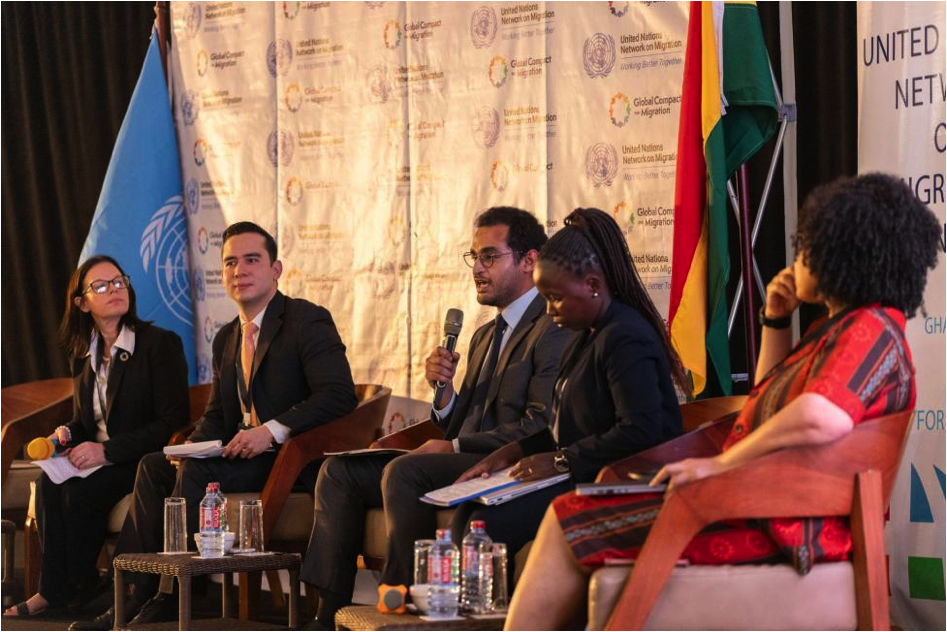Insights from the 3rd Informal Cross-Regional Dialogue on the Global Compact for Migration (GCM)
Context
The Global Compact for Safe, Orderly, and Regular Migration (GCM) has been a landmark agreement since its adoption in 2018, bringing nations together to address the complexities of international migration collaboratively. The GCM Champions Initiative, comprising 33 Member States worldwide, is pivotal in promoting effective GCM implementation. The recent 3rd Informal Cross-Regional Dialogue in Accra, Ghana, brought together representatives from Africa, Arab States, Europe, Latin America, and the Caribbean, marking a critical step towards enhancing collaboration, sharing best practices, and advancing GCM objectives.
Migration Trends in West Africa
In the broader context of migration trends in West Africa, Morocco plays a significant role as a destination and transit country. The North African nation serves as a crucial hub for migrants from various West African countries seeking better economic opportunities, stability, and improved living conditions. This migration dynamic involves both voluntary and involuntary movements, contributing to the complexity of migration patterns in the region.
Morocco, situated at the crossroads of Africa and Europe, has witnessed substantial migration flows, not only as a destination but also as a transit point for individuals aspiring to reach Europe. Within this intricate context, return migration has emerged as a significant phenomenon in Morocco. West African migrants, confronted with challenges such as economic difficulties, social integration issues, and notably, hurdles at the European and Moroccan borders, including pushback policies and forced returns, often opt to return to their countries of origin.
These migration trends have led to the emergence of diverse challenges, including the prevalent use of migrant smugglers operating within and beyond the Economic Community of West African States (ECOWAS) borders. Despite Free Movement Protocols, migrant smugglers are utilized both within and beyond the ECOWAS borders. This intricate web of migration patterns requires comprehensive strategies for effective management.
Recommendations and Best Practices
The dialogue generated recommendations and best practices, focusing on key areas:
1. Data Collection and Exchange:
- Strengthen cooperation for improved data collection.
- Establish regional data-sharing platforms to harmonize methodologies and share best practices.
- Promote transparent and accessible data sharing with stakeholders.
2. Protection of Migrants:
- Enhance mechanisms for identifying and protecting victims of trafficking and smuggling.
- Improve conditions in migrant reception centers, prioritizing safety and dignity.
- Invest in awareness campaigns to educate migrants on risks and prevention.
3. Collaboration for Rights Protection:
- Conduct joint assessments of detention systems to identify gaps and challenges.
- Prioritize alternatives to detention, involving UN agencies and NGOs.
- Review laws allowing the detention of children for immigration-related causes.
4. Climate Change and Migration:
- Prioritize investments in disaster risk reduction and climate change adaptation.
- Include youth as partners in climate change and migration initiatives.
- Develop sustainable solutions for climate-induced migration.
5. Accelerating GCM Implementation:
- Develop National Action Plans for GCM implementation in a step-by-step process.
- Establish clear indicators for monitoring progress in GCM implementation.
- Adopt a coordinated, open, and inclusive approach to GCM implementation.
Notably, Mr. Mohamed Mghari, representing GAPs project partner International Migration Association (AMI) actively participated in the dialogue, representing Morocco. The engagement of the latter exemplified the nation’s commitment to collective efforts in addressing migration challenges. This collaborative platform emphasized the significance of dialogue and shared experiences in navigating the intricacies of GCM implementation. Furthermore, Mr. Mghari delivered a presentation on the case of Morocco during the session on "Data collection: Promoting actionable steps for enhanced cross-regional information sharing to accelerate GCM implementation." The session aimed to discuss ways in which to improve migration research, data collection, and dissemination, particularly in light of emerging cross-regional migration trends, to inform policy making in line with GCM Objective 1 and the commitments made in the IMRF Progress Declaration. His contribution underscores Morocco's proactive approach to shaping effective policies and practices in the realm of migration.
Conclusion
The 3rd Informal Cross-Regional Dialogue served as a catalyst for promoting cooperation, sharing experiences, and advancing the goals of the Global Compact for Migration. The recommendations and best practices identified during the dialogue provide a roadmap for addressing the complexities of migration in diverse regions. As nations work collaboratively, guided by the principles of the GCM, the dialogue in Accra stands as a testament to the power of collective action in shaping a more secure, orderly, and humane global migration landscape.
Photo taken during Mr Mghari’s presentation
Click hear to reach additional reading
Contact: AMI


